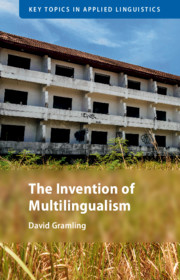Book contents
- The Invention of Multilingualism
- Key Topics In Applied Linguistics
- The Invention of Multilingualism
- Copyright page
- Dedication
- Contents
- Figures
- Preface
- Acknowledgments
- Introduction
- 1 Right-Sizing Multilingualism
- 2 The Problem of Value
- 3 Justice and Injustice
- 4 Hospicing Late Mono/lingualism
- Epilogue The Multilingual Undercommons
- Glossary
- References
- Index
1 - Right-Sizing Multilingualism
Published online by Cambridge University Press: 04 June 2021
- The Invention of Multilingualism
- Key Topics In Applied Linguistics
- The Invention of Multilingualism
- Copyright page
- Dedication
- Contents
- Figures
- Preface
- Acknowledgments
- Introduction
- 1 Right-Sizing Multilingualism
- 2 The Problem of Value
- 3 Justice and Injustice
- 4 Hospicing Late Mono/lingualism
- Epilogue The Multilingual Undercommons
- Glossary
- References
- Index
Summary
In Chapter 1, I argue that “multilingualism” today can be neither just the public and commercial discourse about language diversity in society, nor just the web of diverse and contradictory local practices of multi–, pluri–, or translingual/translanguaging experience around the world. Uplifting the one domain, while downplaying the other, will result in a research landscape unduly skewed in its analyses either toward features of agency and empowerment, or toward features of structure and order. Multilingualism is both of these domains at once. It is, inevitably, a lived and lively tension among local practices, enunciative desires, political economy, and industrial capacity. I thus view “multilingualism” as a praxis under pressure, one that could quite benefit from Applied Linguists’ re-investment and safeguarding at the moment, not its abandonment for an apparently less compromised concept.
- Type
- Chapter
- Information
- The Invention of Multilingualism , pp. 43 - 79Publisher: Cambridge University PressPrint publication year: 2021

